英语翻译
英语常用四字翻译
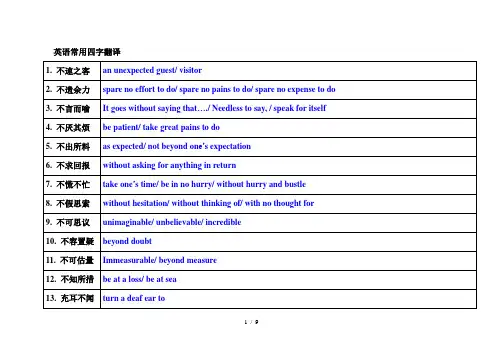
cause and effect/ causal relationship
35.一夜成名
become famous overnight
36.记忆犹新
be fresh in one's memory
37.交头接耳
whisper to each other
38.如饥似渴
with great eagerness
be absorbed in/ concentrate (one’s attention) on/ focus one’s attention on
22.三令五申
give repeated orders and warnings
23.破旧不堪
shabby / be completely worn out
54.固执己见
stick to one's opinions
55.神志清醒
stay conscious
56.逆水行舟
sail against the current
57.尽力而为
try one's best to do/ do everything possible to do
58.精力充沛
be full of energy/ be energetic
27.无从知晓
There’s no telling that…/ It’impossible to know..
28.心不在焉
be absent-minded/ be of two minds
29.一事无成
achieve/ accomplish nothing
30.废寝忘食
neglect one’s meals and sleep
英语课文翻译
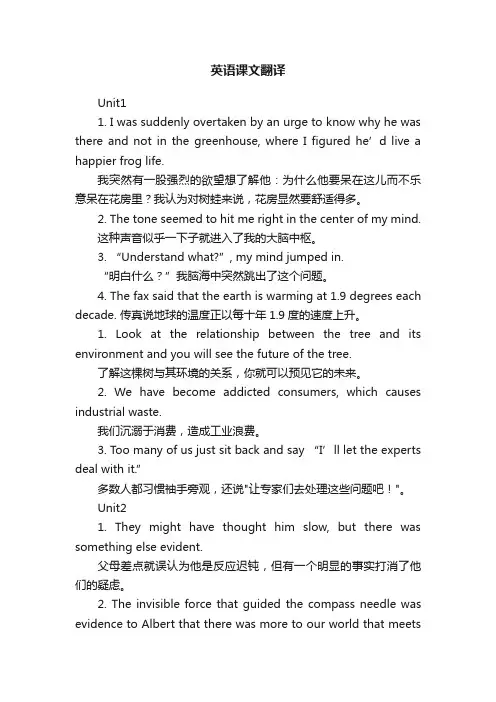
英语课文翻译Unit11. I was suddenly overtaken by an urge to know why he was there and not in the greenhouse, where I figured he’d live a happier frog life.我突然有一股强烈的欲望想了解他:为什么他要呆在这儿而不乐意呆在花房里?我认为对树蛙来说,花房显然要舒适得多。
2. The tone seemed to hit me right in the center of my mind.这种声音似乎一下子就进入了我的大脑中枢。
3. “Understand what?”, my mind jumped in.“明白什么?”我脑海中突然跳出了这个问题。
4. The fax said that the earth is warming at 1.9 degrees each decade. 传真说地球的温度正以每十年1.9度的速度上升。
1. Look at the relationship between the tree and its environment and you will see the future of the tree.了解这棵树与其环境的关系,你就可以预见它的未来。
2. We have become addicted consumers, which causes industrial waste.我们沉溺于消费,造成工业浪费。
3. Too many of us just sit back and say “I’ll let the experts deal with it.”多数人都习惯袖手旁观,还说"让专家们去处理这些问题吧!"。
Unit21. They might have thought him slow, but there was something else evident.父母差点就误认为他是反应迟钝,但有一个明显的事实打消了他们的疑虑。
英语翻译
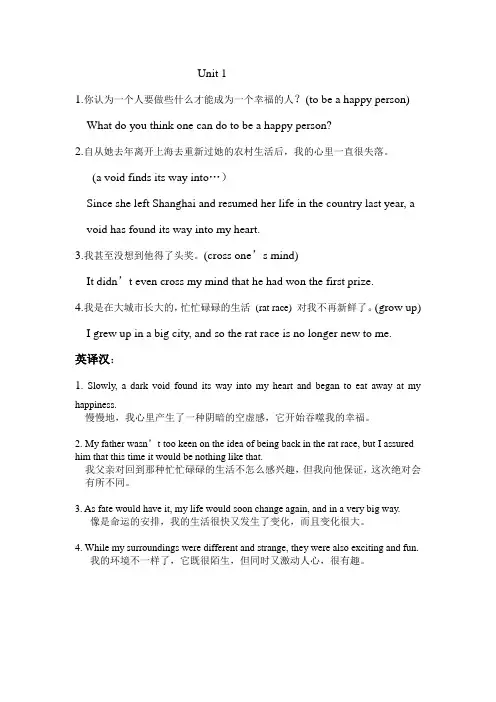
Unit 11.你认为一个人要做些什么才能成为一个幸福的人?(to be a happy person) What do you think one can do to be a happy person?2.自从她去年离开上海去重新过她的农村生活后,我的心里一直很失落。
(a void finds its way into…)Since she left Shanghai and resumed her life in the country last year, a void has found its way into my heart.3.我甚至没想到他得了头奖。
(cross one’s mind)It didn’t even cross my mind that he had won the first prize.4.我是在大城市长大的,忙忙碌碌的生活(rat race) 对我不再新鲜了。
(grow up)I grew up in a big city, and so the rat race is no longer new to me.英译汉:1. Slowly, a dark void found its way into my heart and began to eat away at my happiness.慢慢地,我心里产生了一种阴暗的空虚感,它开始吞噬我的幸福。
2. My father wasn’t too keen on the idea of being back in the rat race, but I assured him that this time it would be nothing like that.我父亲对回到那种忙忙碌碌的生活不怎么感兴趣,但我向他保证,这次绝对会有所不同。
3. As fate would have it, my life would soon change again, and in a very big way.像是命运的安排,我的生活很快又发生了变化,而且变化很大。
220个常用英语单词带中文翻译
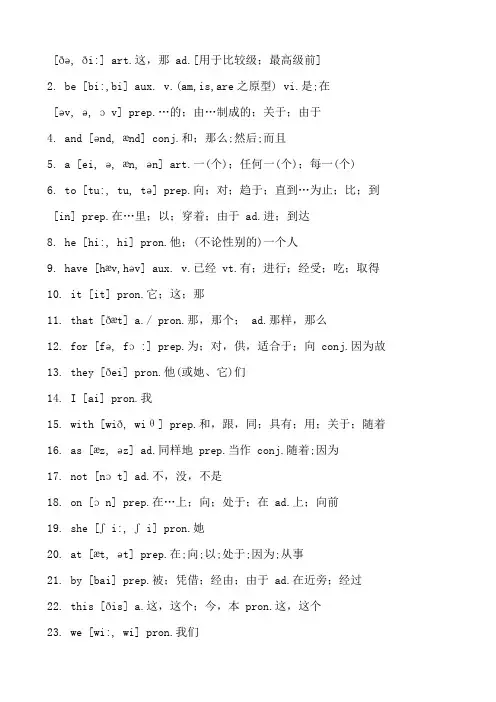
[ðə, ði:] art.这,那 ad.[用于比较级;最高级前]2. be [bi:,bi] aux. v.(am,is,are之原型) vi.是;在[əv, ə, ɔv] prep.…的;由…制成的;关于;由于4. and [ənd, ænd] conj.和;那么;然后;而且5. a [ei, ə, æn, ən] art.一(个);任何一(个);每一(个)6. to [tu:, tu, tə] prep.向;对;趋于;直到…为止;比;到 [in] prep.在…里;以;穿着;由于 ad.进;到达8. he [hi:, hi] pron.他;(不论性别的)一个人9. have [hæv,həv] aux. v.已经 vt.有;进行;经受;吃;取得10. it [it] pron.它;这;那11. that [ðæt] a./ pron.那,那个; ad.那样,那么12. for [fə, fɔ:] prep.为;对,供,适合于;向 conj.因为故13. they [ðei] pron.他(或她、它)们14. I [ai] pron.我15. with [wið, wiθ] prep.和,跟,同;具有;用;关于;随着16. as [æz, əz] ad.同样地 prep.当作 conj.随着;因为17. not [nɔt] ad.不,没,不是18. on [ɔn] prep.在…上;向;处于;在 ad.上;向前19. she [ʃi:, ʃi] pron.她20. at [æt, ət] prep.在;向;以;处于;因为;从事21. by [bai] prep.被;凭借;经由;由于 ad.在近旁;经过22. this [ðis] a.这,这个;今,本 pron.这,这个23. we [wi:, wi] pron.我们24. you [ju, ju:] pron.你,你们25. do [du, du:] aux. v.[代替动词] v.做,干,行动26. but [bʌt,bət] conj.但是;而(是) prep.除…以外 ad.只27. from [frəm,frɔm] prep.出自;离;去除;从;因为;由;与28. or [ɔ:, ə] conj.或,或者;或者说;否则,要不然29. which [witʃ] pron./ a.哪一个(些);[关系代词]那个(些)30. one [wʌn] num.一 pron.一个(人) a.一个的;一体的31. would [wud] aux. v.[will的过去式];总会;也许;请32. all [ɔ:l] a.全部的;尽量的 ad.很 pron.全部33. will [wil] aux. v.将;愿意 n.意志;遗嘱 vt.用意志驱使34. there [ðɛə] pron.[与be连用,“有”] ad.在那里35. say [sei] v.说;表明 ad.比如说,大约 n.发言权36. who [hu:] pron.谁,什么人;[关系代词]…的人37. make [meik] vt.做,制造;产生;成为 n.品牌,类型38. when [wen] ad./ pron.什么时候;在…时 conj.当…时39. can [kæn,kən] aux. v.能;可以 n.罐(头) vt.把…装罐保存40. more [mɔ:r] ad.更(多) a.更多(大)的 n.更多的人(或物)41. if [if] conj.如果,假如;是否;即使;无论何时42. no [nəu] ad.不,不是,没有 a.没有的;不许的43. man [mæn] n.(成年)男人;人,人类 vt.给…配备人员44. out aut] ad.出,向外;在外;出现;完;过时45. other [ˈʌðə] a.别的;其余的 pron.另一个人(或物)46. so [səu] ad.那么,非常;如此 conj.所以;以便47. what [wɔt, wɑ:t] pron.什么;[关系代词] a.多么;什么48. time [taim] n.时间;次;倍[ pl.]时期 vt.为…安排时间49. up [ʌp] ad./ a.向上(的) prep.沿…往上;在…上面50. go [gəu] vi.去;变得;进行;放;通往;消失 n.尝试51. about [əˈbaut] prep.关于;在…周围 ad.大约;在附近52. than [ðæn, ðən] conj.比53. into [ˈintu, ˈintə] prep.进,入,到…里;成为;很喜欢54. could [kud] v. 的过去式;[虚拟语气等]可以(能)55. state [steit] n.状态;国家,政府;州 vt.陈述,说明56. only [ˈəunli] ad.只;反而 a.唯一的;最好的 conj.可是57. new [nju:] a.新的,新出现的,新生产的;生疏的58. year [jiə, jə:] n.年,年份59. some [sʌm,səm] a.一些,有些;某个 pron.一些 ad.大约60. take [teik] vt.带(去);做;花费;拿;服用;乘;拍61. come [kʌm] vi.来(自);经过;至;实现;开始;发生62. these [ði:z] pron.[this的复数]这些63. know [nəu] v.知道;认识;会;认出,分辨;懂得64. see [nəu] v.知道;认识;会;认出,分辨;懂得65. use [ju:z, ju:s]vt.用;耗费,利用 n.使用,应用;用途66. get [get] vt.获得;收到;理解 vi.变得;逐渐;到达67. like [laik] v.喜欢 n.[ pl.]相似(物) prep.像 a.相像的68. then [ðen] ad.当时;那么,因而;然后,于是69. first [fə:st] num.第一 a.第一的 ad.首先;第一次;宁可70. any [ˈeni] pron.无论哪个; a.任何的 ad.丝毫71. work [wə:k] v.工作;有效 n.工作;职业[ pl.]著作72. now [nau] ad.(到)现在,如今;这时候;马上73. may [mei] n.五月74. such [sʌtʃ] a.这样的 ad.那么 pron.这样的人(物)75. give [giv] vt.给予;提供 vi.塌下,折断,弯曲;让步76. over [ˈəuvə] prep.在…的上;关于 ad.颠倒地 a.结束的77. think [θiŋk] vt.认为;想;打算 vi./ n.想,思考78. most [məust] ad.最;十分 a.最多的;大部分的 n.大多数79. even [ˈi:vən] ad.甚至 a.平的;平稳的;双数的 v.(使)平坦80. find [faind] vt.发现;感到;判决 n.(有价值的)发现物81. day [dei] n.天,一昼夜;白昼,白天;时期,时代82. also [ˈɔ:lsəu] ad.而且(也),此外(还);同样地83. after [ˈɑ:ftə] prep./ conj.在…之后 a.以后的 ad.后84. way [wei] n.方法;路;方面[ pl.]习俗 ad.非常85. many [ˈmeni] a.许多的,多的 pron.许多人,许多86. must [mʌst] aux. v.必须,应该;一定 n.必须做的事87. look [luk] v.看;显得;朝着;打量 n.看;脸色88. before [biˈfɔ:] prep.在…前 conj.在…以前 ad.以前89. great [greit] a.大的;伟大的;好极的;擅长的90. back [bæk] ad.回原处 n.背;后面 a.后面的 v.后退91. through [θru:] prep.穿过;从头到尾;凭借 ad./ a.自始至终92. long [lɔŋ] a./ ad.长(期)的(地) n.长时间 vi.渴望93. where [wɛə] ad./ conj.在哪里;在…的地方 pron.哪里94. much [mʌtʃ] ad.十分; a./ n.多(的),大量(的)95. should [ʃud, ʃəd] aux. v.[shall的过去式];应当;可能96. well [wel] ad.好地;完全地 int.那末 a.健康的 n.井97. people [ˈpi:pl] n.人(们);[the~]人民;民族 vt.居住于98. down [daun] a./ ad.向下(的),在下面 prep.沿着…而下99. own [əun] a.自己的 vt.有,拥有100. just [dʒʌst] ad.正好;只是;刚才 a.正义的;恰当的101. because [biˈkɔz] conj.因为102. good [gud] a.好的;擅长的; n.善,好处[ pl.]商品103. each [ˈi:tʃ] pron.各(每)个 a.各,各自的,每 ad.对每个104. those [ðəuz] pron.[that的复数]那些105. feel [fi:l] vi.觉得;给人以…感觉 vt.摸;认为 n.感觉106. seem [si:m] vi.好像,似乎107. how [hau] ad.怎么,怎样;多么,多少108. high [hai] a.高(级;尚;兴)的 ad.高 n.高峰(潮,水平) 109. too [tu:] ad.也,还;太,过于;很,非常110. place [pleis] n.地方;职位;名次 vt.放置;任命111. little [ˈlitl] a.小的;短的;不多的 n.极少 ad.毫不112. world [wə:ld] n.(全)世界,地球;世间(人);界,领域113. very [ˈveri] ad.很;完全地 a.正是的,真实的;完全的114. still [stil] ad.还;然而 a.静止的 n.剧照 v.(使)平静115. nation [ˈneiʃən] n.国家,民族116. hand [hænd] n.手;指针;人手;帮助;手艺 vt.交,递117. old [əuld] a.老的;过时的;以前的;老练的118. life [laif] n.生命;一生;生活,人生;生物;活力119. tell [tel] v.讲(述),告诉;吩咐;认出;显示;生效120. write [rait] v.写,写字;写作,作曲;写信(给)121. become [biˈkʌm] vi.变成,开始变得 vt.适合,同…相称122. here [hiə] ad.在(向,到)这里 int.[用于引起注意]123. show [ʃəu] v./ n.表明;出示;演出,放映;展览(会)124. house [haus] n.房屋;公司;(H-)议院 vt.给…房子住125. both [bəuθ] a.两个…(都) pron.两者(都),双方(都)126. between [biˈtwi:n] prep.在…之间;为…所**127. need [ni:d] vt.需要;缺少 .必须 n.需要;贫困128. mean [mi:n] vt.意思是;意欲 vi.特意 a.吝啬的;平均的129. call [kɔ:l] v./ n.把…叫做;打电话给;叫;访问;电话130. develop [diˈveləp] vt.发展;制订;产生 vi.生长;发展131. under [ˈʌndə] prep./ ad.在…下面;少于;在…情况下132. last [lɑ:st] a.刚过去的;最后的 ad.最后 vi.持续133. right [rait] a./ ad.对(的);右(的) int.好 n.权利;右134. move [mu:v] v.搬;动摇;感动 n.动作;移动,搬家135. thing [θiŋ] n.事;物[常 pl.]局面;所有物,用品136. general [ˈdʒenərəl] a.一般的;总的,普遍的;笼统的 n.将军137. school [sku:l] n.学校,学院;上学,学业;学派138. never [ˈnevə] ad.从不,永不;决不,千万不139. same [seim] a.相同的 pron.[the-]同样的人(物)140. another [əˈnʌðə] pron.再(另)一个 a.再一个的;别的141. begin [biˈgin] v.开始142. while [wail] conj.当…的时;而;虽然 n.一会儿 vt.消磨143. number [ˈnʌmbə] n.数字;号码[常略作N o.]号 vt.编号144. part [pɑ:t] n.部分;零件;作用 v.(使)分开 ad.部分地145. turn [tə:n] v.转动;扭转;(使)变成 n.转向;轮流146. real [riəl] a.真的,真正的;真实的,现实的147. leave [li:v] v.出发;离开;留下 n.准假;许可;告辞148. might [mait] aux. v.[may的过去式];可能 n.力量;权势149. want [wɔnt, wɑ:nt] v.想要;缺乏 n.不足[ pl.]需要的东西150. point [pɔint] n.要点,观点;点;时刻 v.指,指明151. form [fɔ:m] n.形式;外形;表格 v.形(构)成,产生152. off [ɔ(:)f] ad.…掉(下);离开;停止;休息 a.休息的153. child [tʃaild] n.小孩,儿童;子女,孩子154. few [fju:] a./ n.[表示否定]很少(的),几乎没有(的)155. small [smɔ:l] a.小的;少的;不重要的156. since [sins] conj./ prep.从…以后;因为 ad.后来157. against [əˈgenst] prep.逆,反(对),违反;对...不利158. ask [ɑ:sk] vt.询问;请求;邀请 vi.(for)请求159. late [leit] a.晚的;晚期的;最近的 ad.迟,晚160. home [həum] n.家(乡);原产地 a.家庭(乡)的 ad.回家161. interest [ˈintrist] n.兴趣;利息(率)[ pl.]利益 vt.使感兴趣162. large [lɑ:dʒ] a.大的;(数量)多的,众多的163. person [ˈpə:sn] n.人164. end [end] n.末尾;尽头;终止;结果 v.结束,终止165. open [ˈəupən] a.开的,开放的,公开的 v.开;开始;开放166. public [ˈpʌblik] a.公众的;公共的;公开的 n.公众,民众167. follow [ˈfɔləu] vt.接着;遵照;听懂;注视 vi.(紧)接;懂168. during [ˈdjuəriŋ] prep.在…期间169. present [priˈzent, ˈprezənt] a.出席的;现在的 n.现在;礼物 vt.赠(送)170. without [wiˈðaut] prep.无,没有 ad.在外面171. again [əˈgein] ad.再(又)一次;到原处;而且172. hold [həuld] v.拿;保持;掌握;主持 n.握住;掌握;船舱173. govern [ˈgʌvən] vt.统治,治理,管理;支配,影响174. around [əˈraund] ad.在周围;到处;大约 prep.遍及175. possible [ˈpɔsəb(ə)l] a.可能的,做得到的;可接受的,合理的176. head [hed] n.头(脑);顶部;领导 vt.领导 vi.朝…行进177. consider [kənˈsidə] v.考虑,细想;认为,把…看作;考虑到178. word [wə:d] n.(单)词[ pl.]言语,话;传说;诺言179. program [ˈprəugræm] n.计(规)划;节目(单);程序 vt.编程180. problem [ˈprɔbləm] n.问题,疑难问题;思考题,讨论题181. however [hauˈevə] ad.然而,可是;无论如何 conj.不管怎样182. lead [li:d] v.带路;领导;致使;通向 n.领导;主角;铅183. system [ˈsistəm] n.系统;制度,体制;方法;身体184. set [set] n.(一)套 a.规定的 vt.放,安装 vi.落山185. order [ˈɔ:də] n.顺序;定购;秩序;命令 vt.命令;定购186. eye [ai] n.眼(睛);视力;眼力;监督 vt.看,审视187. plan [plæn] n.计划;平面图,示意图 v.(制订)计划188. run [rʌn] vi.跑;运转;竞选;流 vt.经营 n.跑步189. keep [ki:p] v.(使)保持,(使)继续;阻止;遵守;保有190. face [feis] n.脸,面部表情;外表;表面 v.面向;面对191. fact [fækt] n.事实,真相192. group [gru:p] n.组,群;集团 vt.把…分组;使聚集 vi.聚集193. play [plei] v.玩,打(球等);播放 n.戏剧;游戏,比赛194. stand [stænd] vi.站;坐落;处于;忍受 n.台;摊;立场195. increase [inˈkri:s, ˈinkri:s] v.增加,增长,增强 n.增加,增长,增强196. early [ˈə:li] a.早(期)的,在前的;早熟的 ad.在早期;早197. course [kɔ:s] n.课程;过程;做法;路线;(一)道(菜)198. change [tʃeindʒ] v.改变;交换;兑换 n.变化;更换;零钱199. help [help] v.帮(援)助;有助于;[呼救]救命 n.帮助(手)200. line [lain] n.(界)线;条纹;方针;线路 v.排队(齐)201. city [ˈsiti] n.城市,都市202. put [put] vt.放,使处于;表达;提交;记下203. close [kləuz] v.关;(使)接近 a.近的 ad.接近地 n.结束204. case [keis] n.事例;情况;病例;案件;盒;手提箱205. force [fɔ:s] n.[ pl.]军队;暴力 vt.强迫;用力推动206. meet [mi:t] vt.遇见;见面;满足 vi.相遇;开会 n.运动会207. once [wʌns] ad.一次;曾经,一度 conj.一旦…(就…) 208. water [ˈwɔ:tə] n.水 vt.浇(供,加)水 vi.流泪(口)水209. upon [əˈpɔn] prep. 在...之上.210. war [wɔ:] n.战争;斗争,竞211. build [bild] vt.建造;创立 vi.向顶点发展 n.体型,体格212. hear [hiə] vt.听见;听到,得知;审讯,听证 vi.听说213. light [lait] n.光;灯;火 a.明亮的;轻的 vt.点亮214. unite [ju(:)ˈnait] v.(使)联合,(使)团结,(使)统一215. live [laiv] vi.居住;活;难忘 vt.生活 a.活的;直播的216. every [ˈevri] a.每一(个);每…一次的,每隔…的217. country [ˈkʌntri] n.国家,全国人民;[the~]农村,乡村218. bring [briŋ] vt.带来;把…引来;促使;使发生219. center [ˈsentə] n.圆心,正中;中心 v.(around)把…集中于220. let [let] vt.允许,让;假设;出租。
100个英语翻译

70.重视 attach great importance to…
71.社会地位 social status
72.把时间和精力放在…上 focus time and energy on…
73.扩大知识面 expand one’s scope of knowledge
74.身心两方面 both physically and mentally
78.缓解压力/ 减轻负担 relieve stress/ burden
79.优先考虑/发展… give (top) priority to sth.
80.与…比较 compared with…/ in comparison with
81. 相反 in contrast / on the contrary.
14.就…达到绝对的一致 reach an absolute consensus on…
15.有充分的理由支持 be supported by sound reasons
16.双方的论点 arguments on both sides
17.发挥着日益重要的作用 play an increasingly important role in…
54.在一定程度上 to some extent/ degree / in some way
55. 理论和实践相结合 integrate theory with practice
56. …必然趋势 an irresistible trend of…
57.日益激烈的社会竞争 the increasingly fierce social competition
34.为社会做贡献 make contributions to the society
(完整版)英语三级翻译大全
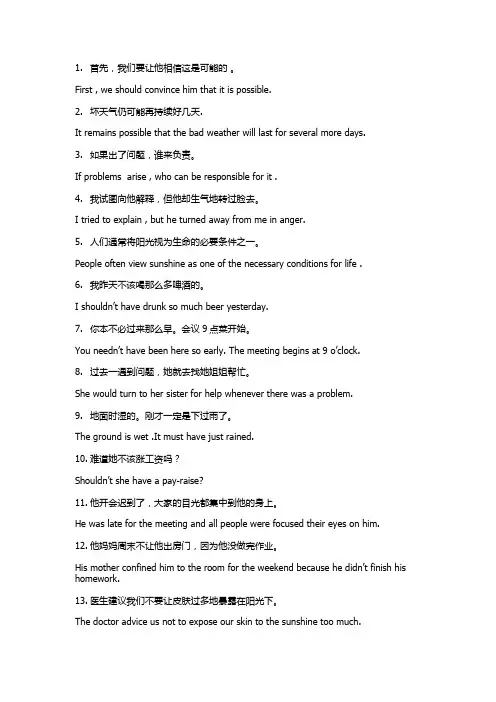
1.首先,我们要让他相信这是可能的。
First , we should convince him that it is possible.2.坏天气仍可能再持续好几天.It remains possible that the bad weather will last for several more days.3.如果出了问题,谁来负责。
If problems arise , who can be responsible for it .4.我试图向他解释,但他却生气地转过脸去。
I tried to explain , but he turned away from me in anger.5.人们通常将阳光视为生命的必要条件之一。
People often view sunshine as one of the necessary conditions for life .6.我昨天不该喝那么多啤酒的。
I shouldn’t have drunk so much beer yesterday.7.你本不必过来那么早。
会议9点菜开始。
You needn’t have been here so early. The meeting begins at 9 o’clock.8.过去一遇到问题,她就去找她姐姐帮忙。
She would turn to her sister for help whenever there was a problem.9.地面时湿的。
刚才一定是下过雨了。
The ground is wet .It must have just rained.10.难道她不该涨工资吗?Shouldn’t she have a pay-raise?11.他开会迟到了,大家的目光都集中到他的身上。
He was late for the meeting and all people were focused their eyes on him. 12.他妈妈周末不让他出房门,因为他没做完作业。
英语翻译
• Dec. 6 • 这次比赛将由我父亲工作的那个公司赞助。 (sponsor) • 疾病正在流行,所有的幼儿都有危险。 (spread v.) • 一个怪念头突然浮现在我脑海。(spring up) • 众所周知,WTO代表世界贸易组织。 (stand) • 那两个卫兵一动不动地站在大楼前,除了 眼球在不时地动。 ( stand )
• 许多重要的信息被储存在计算机里。(store v.) • A lot of important information in stored in computers. • 他们被困在一个孤岛上,但幸运的是,一 个援救队很快来营救他们。(strand) • They were stranded on a lonely island. But they were lucky because a rescue team came / went to their rescue quickly. • 他凡事都严格要求他自己。(strict) • He is strict with himself in everything.
• 由于李老师病了,今天张老师代她的课。 (substitute) • As Ms. Li is ill, Ms Zhang will substitute for her. • 在过去几年里,这家工厂用塑料代替木头 来降低成本。(substitute) • In the past few years, the factory has substituted plastics for wood to reduce the costs.
Dec. 5 1.他很忙,可能腾不出时间来参加明天的讨论 了。(spare) 2.根据学校的要求,每个学生都必须主修三门 学科。(specialize) 3.老师们兴致勃勃地看完了学生的表演。(spirit) 4.尽管困难重重,我们仍决心执行我们的计划。 (spite) 5.天气不好,破坏了我们的露营计划。 ( spoil )
常用英语翻译
甲基乙稀Methyl ethylene封箱带joint sealing tape厂房Workshop贴片电阻Chip Resistor肉色Fleshcolor干重dry weight茶色的tawny离形纸release paper锈迹rusty stain纬创WISTRON美纹胶带Masking tape洋白铜copper-nickel-zinc alloy牛卡纸Kraft liner board珍珠棉Pearl cotton广达Quanta奇美CHIMEI中达Delta (用IEC的方法)帝人Teijin三菱MITSUBISHI纬创 WISTRON生方美丽华 UbukataMerycon Electric仁宝 Compal三星Samsung立邦NipponTech-Front 达丰1 金属镀层:默认的测试方法是IEC62321的沸水萃取法。
结果单位是mg/kg with 50cm2. 如果客户需要用ppm 结果表示,则要求客户提供密度厚度2 金属材料(没有镀层):默认测试方法是IEC62321的沸水萃取法。
结果单位是mg/kg with 50cm2。
如果客户要求出ppm结果或者客户要求EPA方法测试,则用EPA3060A进行测试,给ppm结果3 金属和镀层混侧; 同金属材料(没有镀层)处理。
特殊情况:客户要求用IEC方法,金属和镀层混侧,要求给ppm结果。
这时拒绝这个要求。
要求用EPA3060A测试。
Negative表示阴性(不含有Cr6+)Positive表示阳性(含有Cr6+)Negative = Absence of Cr6+Positive = Presence of Cr6+ X。
常用的英语单词翻译
常用的英语单词翻译在学习英语的过程中,掌握常用单词的翻译是非常重要的。
以下是一些常见的英语单词及其中文对应的翻译,希望能够帮助大家更好地学习和运用英语。
1.Hello - 你好2.Goodbye - 再见3.Thank you - 谢谢你4.Please - 请5.Sorry - 对不起6.Yes - 是的7.No - 不8.Good - 好的9.Beautiful - 美丽的10.Happy - 开心的11.Sad - 伤心的12.Love - 爱13.Family - 家庭14.Friend - 朋友15.Food - 食物16.Water - 水17.Fire - 火18.Earth - 地球19.Sky - 天空20.Sun - 太阳21.Moon - 月亮22.Star - 星星23.Tree - 树24.Flower - 花25.Animal - 动物26.Bird - 鸟27.Dog - 狗28.Cat - 猫29.Fish - 鱼30.Home - 家31.School - 学校32.Work - 工作33.Play - 玩34.Read - 读35.Write - 写36.Sleep - 睡觉37.Walk - 走路38.Run - 跑39.Swim - 游泳40.Dance - 跳舞以上是一些常用的英语单词及其中文翻译,希望这些词汇能够帮助大家更好地理解和运用英语。
欢迎大家继续学习,提高英语水平!。
常用英语词汇以及它们的中文翻译
常用英语词汇以及它们的中文翻译1.Hello -你好2.Goodbye -再见3.Thank you -谢谢4.Sorry -对不起5.Yes -是的6.No -不是7.Please -请8.Hello/Hi -你好/嗨9.How are you? -你好吗?10.Fine -很好11.Good morning -早上好12.Good afternoon -下午好13.Good evening -晚上好14.What's your name? -你叫什么名字?15.My name is... -我的名字是...16.Nice to meet you -很高兴认识你17.See you later -待会儿见18.See you tomorrow -明天见19.Love -爱20.Like -喜欢21.Apple -苹果22.Banana -香蕉23.Orange -橙子24.Book -书25.Pen -钢笔26.Paper -纸27.Map -地图28.Chair -椅子29.Table -桌子30.Sofa -沙发31.Bed -床puter -电脑33.Phone -电话34.Key -钥匙35.Watch -手表36.Car -小汽车37.Bus -公交车38.Train -火车39.Plane -飞机40.Ship -船41.Hat -帽子42.Shoes -鞋子43.Shirt -衬衫44.Pants -裤子45.Coat -外套46.Glasses -眼镜47.Cup -杯子48.Plate -盘子49.Fork -叉子50.Knife -刀51.Spoon -勺子52.Bottle -瓶子53.Umbrella -雨伞54.Hatchet-斧头55.Camera-照相机56.Picture-图片;照片57.Song-歌曲58.Movie-电影59.Game-游戏;比赛ugh-笑;发笑61.Cry-哭泣;喊叫62.Happy-快乐的;幸福的;满意的;乐意的;心甘情愿的。
- 1、下载文档前请自行甄别文档内容的完整性,平台不提供额外的编辑、内容补充、找答案等附加服务。
- 2、"仅部分预览"的文档,不可在线预览部分如存在完整性等问题,可反馈申请退款(可完整预览的文档不适用该条件!)。
- 3、如文档侵犯您的权益,请联系客服反馈,我们会尽快为您处理(人工客服工作时间:9:00-18:30)。
Asians and North Americans really do see the world differently. Shown a photograph, North American students of European background paid more attention to the object in the foreground of a scene, while students from China spent more time studying the background and taking in the whole scene, according to University of Michigan researchers.The researchers, led by Hannah-Faye Chua and Richard Nisbett, tracked the eye movements of the students - 25 European Americans and 27 native Chinese - to determine where they were looking in a picture and how long they focused on a particular area.``They literally are seeing the world differently,'' said Nisbett, who believes the differences are cultural.``Asians live in a more socially complicated world than we do,'' he said in a telephone interview. ``They have to pay more attention to others than we do. We are individualists. We can be bulls in a china shop, they can't afford it.''The findings are reported in Tuesday's issue of Proceedings of the National Academy of Sciences.The key thing in Chinese·culture is harmony, Nisbett said, while in the West the key is finding ways to get things done, paying less attention to others.And that, he said, goes back to the ecology and economy of times thousands of years ago.In ancient China, farmers developed a system of irrigated agriculture, Nisbett said. Rice farmers had to get along with each other to share water and make sure no one cheated.Western attitudes, on the other hand, developed in ancient Greece where there were more people running individual farms, raising grapes and olives, and operating like individual businessmen.So differences in perception go back at least 2,000 years, he said.Aristotle, for example, focused on objects. A rock sank in water because it had the property of gravity, wood floated because it had the property of floating. He would not have mentioned the water. The Chinese, though, considered all actions related to the medium in which they occurred, so they understood tides and magnetism long before the West did.Nisbett illustrated this with a test asking Japanese and Americans to look at pictures of underwater scenes and report what they saw.The Americans would go straight for the brightest or most rapidly moving object, he said, such as three trout swimming. The Japanese were more likely to say they saw a stream, the water was green, there were rocks on the bottom and then mention the fish.The Japanese gave 60 percent more information on the background and twice as much about the relationship between background and foreground objects as Americans, Nisbett said.In the latest test, the researchers tracked the eye movement of the Chinese and Americans as they looked at pictures.The Americans looked at the object in the foreground sooner -a leopard in the jungle for example - and they looked at it longer. The Chinese had more eye movement, especially on the background and back and forth between the main object and the background, he said.Reinforcing the belief that the differences are cultural, he said, when Asians raised in North America were studied, they were intermediate between native Asians and European-Americans, and sometimes closer to Americans in the way they viewed scenes.Kyle R. Cave of the University of Massachusetts at Amherst commented: ``These results are particularly striking because they show that these cultural differences extend to low level perceptual processes such as how we control our eyes. They suggest that the way that we see and explore the world literally depends on where we come from.''Cave said researchers in his lab have found differences in eye movement between Asians and Westerners in reading, based on differences in the styles of writing in each language.``When you look beyond this study to all of the studies finding cultural differences, you find that people from one culture do better on some tasks, while people from other cultures do better on others. I think it would be hard to argue from these studies that one culture is generally outperforming the other cognitively,'' Cave said.亚洲人和北美人确实对世界有不同的看法。
一张照片显示,欧洲背景的北美学生更重视场面的前景对象,而来自中国的学生花更多的时间研究的背景,以整个场景,根据密歇根大学的研究人员。
研究人员,由Hannah Faye Chua和Richard Nisbett,跟踪学生的眼球运动,欧洲25的美国人和27的中国本土-确定他们在寻找图片多久他们集中在一个特定的地区。
` `他们从字面上所看到的世界是不同的,”尼斯比特说,他认为这是文化差异。
他在接受电话采访时说:“亚洲人生活在一个比我们更复杂的社会环境中。
”。
他们必须比我们更注意别人。
